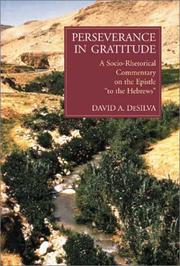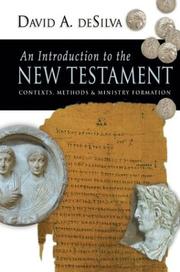| Listing 1 - 10 of 16 | << page >> |
Sort by
|

ISBN: 0802841880 9780802841889 Year: 2000 Publisher: Grand Rapids (Mich.): Eerdmans
Abstract | Keywords | Export | Availability | Bookmark
 Loading...
Loading...Choose an application
- Reference Manager
- EndNote
- RefWorks (Direct export to RefWorks)
227.1*9 --- 227.1*9 Brief van Paulus aan de Hebreeën --- Brief van Paulus aan de Hebreeën --- Socio-rhetorical criticism. --- Bible. --- Epistle to the Hebrews --- Hebräerbrief (Book of the New Testament) --- Hebrews (Book of the New Testament) --- Poslanie do Evreite (Book of the New Testament) --- Risālah ilá al-ʻIbrānīyīn (Book of the New Testament) --- Bible NT. Epistles of Paul. Hebrews
Book
ISBN: 9781426742354 1426742355 Year: 2012 Publisher: Nashville Abingdon Press
Abstract | Keywords | Export | Availability | Bookmark
 Loading...
Loading...Choose an application
- Reference Manager
- EndNote
- RefWorks (Direct export to RefWorks)
Book
ISBN: 9780195329001 0195329007 Year: 2012 Publisher: New York Oxford University Press
Abstract | Keywords | Export | Availability | Bookmark
 Loading...
Loading...Choose an application
- Reference Manager
- EndNote
- RefWorks (Direct export to RefWorks)
Apocryphal books --- Criticism, interpretation, etc. --- Bible --- Criticism, interpretation, etc --- 229*2 --- 229*2 Apocriefen van het Oude Testament. Pseudepigrafen van het Oude Testament --- Apocriefen van het Oude Testament. Pseudepigrafen van het Oude Testament --- History and criticism --- Bible. --- Apocrypha --- Apocryphal books - Criticism, interpretation, etc.
Book
ISBN: 9780664224493 0664224490 Year: 2009 Publisher: Louisville Westminster/John Knox Press
Abstract | Keywords | Export | Availability | Bookmark
 Loading...
Loading...Choose an application
- Reference Manager
- EndNote
- RefWorks (Direct export to RefWorks)
228 --- Apocalyps. Boek der Openbaring van Johannes. Apocalyptiek --- Bible. --- Abūghālimsīs --- Apocalipse (Book of the New Testament) --- Apocalisse (Book of the New Testament) --- Apocalypse (Book of the New Testament) --- Apocalypse of John --- Apocalypse of St. John --- Apocalypsis Johannis --- Apocalypsis S. Johannis --- Apokalypse (Book of the New Testament) --- Apokalypsin --- Book of Revelation --- Johannes-Apokalypse --- Johannesapokalypse --- Johannesoffenbarung --- Offenbarung des Johannes --- Revelation (Book of the New Testament) --- Revelation of St. John --- Revelation of St. John the Divine --- Revelation to John --- Ruʼyā (Book of the New Testament) --- Sifr al-Ruʼyā --- Yohan kyesirok --- Criticism, interpretation, etc. --- Bible NT. Revelation --- Apokalipsa św. Jana --- Apokalipsa świętego Jana

ISSN: 15723755 ISBN: 1435614666 9781435614666 9004147764 9789004147768 9789047408512 Year: 2006 Publisher: Leiden Brill
Abstract | Keywords | Export | Availability | Bookmark
 Loading...
Loading...Choose an application
- Reference Manager
- EndNote
- RefWorks (Direct export to RefWorks)
This commentary examines 4 Maccabees as a contribution to the ongoing reformulation of Jewish identity and practice in the Greek-speaking Diaspora. It analyzes the Jewish author's interaction with, and facility in, Greek rhetorical conventions, ethical philosophy, and literary culture, giving attention also to his use and interpretation of texts and traditions from the Jewish Scriptures and other Hellenistic Jewish writings. The commentary exhibits the author's skillful weaving together of all these resources to create a text that interprets the Torah-observant life as the fullest embodiment of the best Greek ethical ideals. A distinctive feature is the examination of how the experience of reading 4 Maccabees in Codex Sinaiticus differs from the experience of reading the eclectic text.
Judaism --- Religion --- Philosophy & Religion --- Fourth Book of Maccabees --- Codex Sinaiticus (Biblical manuscript) --- Bible. --- 4 Maccabees (Apocryphal book) --- 4th Maccabees (Apocryphal book) --- Fourth Maccabees (Apocryphal book) --- IV Maccabees (Apocryphal book) --- Book of IV Maccabees --- De Machabais (Apocryphal book) --- De Maccabaeis (Apocryphal book) --- Flavii Iosephi De Maccabaeis --- Flavii Iosephi Peri autokratoros logismou --- Iōsēpos peri autokratoros logismou --- Peri autokratoros logismou --- Flavii Iosephi De imperio rationis --- 091:22 --- 091 <41 LONDON> --- 091 =75 --- 222.9 --- 091:22 Bijbels--(handschriften) --- Bijbels--(handschriften) --- 091 =75 Handschriftenkunde. Handschriftencatalogi--Grieks --- Handschriftenkunde. Handschriftencatalogi--Grieks --- 091 <41 LONDON> Handschriftenkunde. Handschriftencatalogi--Verenigd Koninkrijk van Groot-Brittannië en Noord-Ierland--LONDON --- Handschriftenkunde. Handschriftencatalogi--Verenigd Koninkrijk van Groot-Brittannië en Noord-Ierland--LONDON --- Makkabeeën --- Religion, Primitive --- Atheism --- Irreligion --- Religions --- Theology
Book
ISBN: 1577995600 9781577995609 1577995856 9781577995852 1577995856 Year: 2014 Publisher: Bellingham, WA Lexham Press
Abstract | Keywords | Export | Availability | Bookmark
 Loading...
Loading...Choose an application
- Reference Manager
- EndNote
- RefWorks (Direct export to RefWorks)
Paul, --- Pavel, --- Pavol, --- Paulus, --- Paulos, --- Pōghos, --- Paweł, --- Pawełm --- Būlus, --- Pablo, --- Paulo, --- Paolo, --- Pál, --- Apostolos Paulos --- Saul, --- القديس بولس الرسول --- بولس، --- 사도바울 --- Teachings. --- Bible. --- Epistles of Paul --- Paul, Epistles of --- Paul Sŏsin --- Pauline epistles --- Risālat al-Qiddīs Būlus al-rasūl al-thāniyah ilá Tīmūthīʼūs --- Theology.

ISBN: 0830827463 1844740234 9780830827466 9781844740239 Year: 2004
Abstract | Keywords | Export | Availability | Bookmark
 Loading...
Loading...Choose an application
- Reference Manager
- EndNote
- RefWorks (Direct export to RefWorks)
Some introductions to the New Testament highlight the historical contexts in which the New Testament literature was written. This introduction gives particular attention to the social, cultural and rhetorical contexts of the New Testament authors and their writings. Few introductions to the New Testament integrate instruction in exegetical and interpretive strategies with their customary considerations of authorship, dating, audience and message. This introduction capitalizes on the opportunities, introducing students to a relevant facet of interpretation with each portion of New Testament literature. Rarely do introductions to the New Testament approach their task mindful of the needs of students preparing for ministry. This introduction is explicit in doing so, assuming as it does that the New Testament itself--in its parts and as a whole--is a pastoral response. Each chapter on the New Testament literature closes with a discussion of the implications for ministry formation. These integrative features alone would distinguish this introduction from others. But in addition, its pages brim with maps, photos, points of interest and aids to learning. Separate chapters explore the historical and cultural environment of the New Testament era, the nature of the Gospels and the quest for the historical Jesus, and the life of Paul. This introduction by David A. deSilva sets a new standard for its genre and is bound to appeal to many who believe that the New Testament should be introduced as if both scholarship and ministry mattered.
Book
ISBN: 9781108493710 1108493718 9781108725446 1108725449 9781108643054 1108643051 Year: 2022 Publisher: Cambridge Cambridge University Press
Abstract | Keywords | Export | Availability | Bookmark
 Loading...
Loading...Choose an application
- Reference Manager
- EndNote
- RefWorks (Direct export to RefWorks)
"In this commentary, David deSilva approaches Ephesians as Paul's contribution to the ongoing work of forming his converts' individual and collective identity in Christ through the celebration of God's activity (past, ongoing, and future) on behalf of all who had responded in trust and faithfulness toward Jesus throughout the eastern Roman empire. He explores how Paul's first-century audiences in Roman Asia would have understood and responded to his message, particularly his promotion of the attitudes, pursuits, and practices that would constitute an appropriate response of gratitude for so costly a deliverance and so magnificent a destiny. deSilva's discussion is richly grounded in the Jewish and Greco-Roman contexts that both informed Paul as he composed and his audiences as they engaged his message. He is also attentive to points of relevance to the modern contexts of today's readers who continue to wrestle with Paul's vision for Christian discipleship and human community"--

ISBN: 0814658237 Year: 1999 Publisher: Wilmington Glazier
Abstract | Keywords | Export | Availability | Bookmark
 Loading...
Loading...Choose an application
- Reference Manager
- EndNote
- RefWorks (Direct export to RefWorks)
Honor in the Bible --- Bible. --- Socio-rhetorical criticism.
Book
ISBN: 0788502018 Year: 1996 Publisher: Atlanta Scholars Press
Abstract | Keywords | Export | Availability | Bookmark
 Loading...
Loading...Choose an application
- Reference Manager
- EndNote
- RefWorks (Direct export to RefWorks)
Honor in the Bible --- Bible. --- Socio-rhetorical criticism.
| Listing 1 - 10 of 16 | << page >> |
Sort by
|

 Search
Search Feedback
Feedback About UniCat
About UniCat  Help
Help News
News